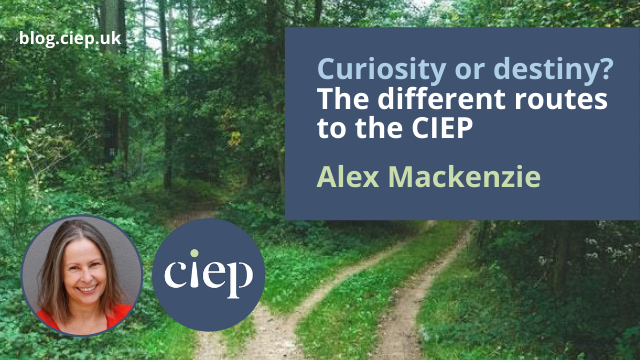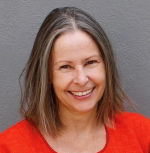A diverse group of over 20 proofreaders and editors meet up weekly online for professional support through the CIEP’s Cloud Club West. But what do we actually know about each other? Alex Mackenzie asked in a recent meeting: ‘What was your route to the CIEP? Where were you workwise when the proofreading/copyediting penny dropped?’
Here’s what the group discussed:
- Are proofreaders and editors born or is it a process of discovery?
- Is an English literature degree or a Master’s in publishing a must-have?
- Can family life or challenging health conditions accommodate the job?
- When did you switch to proofreading and editing?
- How did the CIEP come into your life and what do you enjoy about it?
 My ‘ah-ha’ moment
My ‘ah-ha’ moment
Did my itinerant life lead me here? Perhaps copyediting was my way of joining up the dots when our international life abruptly halted: COVID-19 meets Brexit. It was the CIEP training, discovering the humble dialogue between professionals in the forums and our ‘e-local’ weekly video meet-ups that grounded me in this fascinating profession.
My question for Cloud Club West (CCW) began an entertaining and revealing round-the-table storytelling that lasted four weeks.
It’s in the blood
‘From an early age I knew – then I learned it was a job!’
Some were students of English literature or creative writing, others hold a Master’s degree in publishing. Isn’t that how real editors are made? Whether fresh out of university or experienced in-house editors with high-profile publishers, we are all now freelancing proofreaders and editors.
Loving the detail
‘I want to do something with books.’
Writing up references for her third thesis – enjoying the rigorous detail of italics and comma placement – one member wanted to put this body of knowledge to use. After writing to 50 publishers, she found work as an assistant with a reputable one. Her CIEP membership number is in the low hundreds, and her editorial life spans the digital revolution: marking up on paper before kids, on-screen after.
Teachers turned editors
‘After decades helping multilingual students find their voice – this was a natural transition.’
For the rest, there was a delayed ‘ah-ha’ moment of discovery. Teaching was the starting point for many. Some changed direction during the training, others resigned with a health condition or burnout; for one fantasy fiction lover and gamer, COVID-19 showed them they weren’t quite in the right place. Though teaching made sense at some levels, we are happier now – a clue? One of us has never missed a CCW meeting!
I need to leave – but now what?
‘After numbers, words – it’s what I should be doing.’
For those editors who arrived through maths and science, there may have been a clear moment of recognition. One left a health-threatening, high-pressure job in a civil service payroll department where, in her ‘spare’ time, she was copyediting multi-author reports and writing how-to documents. The required attention to detail crossed seamlessly into scholarly editing, but now she dictates the work on her terms and the ulcers have healed.
A serendipitous escape from the macho world of finance
‘Do I know a proofreader? … err … me?’
Several of us were economists – proofreading financial reports with 24-hour deadlines. A financial crash prompted retraining as an English teacher, another tired of the male-dominated office and moved countries every 18 months thereafter. One catapulted herself forward answering the question ‘Do you know a proofreader?’ with ‘Err … yes, me!’
Globetrotter slowed down
‘I’m thankful to be working from home near my very elderly mum.’
Our former lawyer had understandable burnout after 20 years dealing with international commercial litigation, with commutes between the UK and Brussels (twice in one day, even!), as well as Canada, the US and other EU countries. A significant domestic violence practice in her latter years in the law added to the burnout. Though she was a guinea pig for the functionality of the online interface for joining the SfEP (as it was then), she welcomed the friendliness and support of the face-to-face Norfolk group and is now much appreciated, steering our Cloud Club steadily from Canada (… for now!), where in non-COVID-19 times she enjoys the lively Toronto group face to face, and now via Zoom.
A change of heart
‘I’ve grown into the job – I’m doing the right thing in life!’
Another economics graduate left the sector after questioning their calling. An ad offered editorial training in using their expertise for academic research. Later, after moving to Canada, he enjoyed a warm welcome from the CIEP local group, and the 2020 conference ‘sealed the deal’. He is now an in-house editor.
 Academic detour
Academic detour
‘I was always checking others’ words.’
In fact, academics across the subject range were thrilled to learn there were paying jobs outside educational institutions, where subject knowledge was valued. After internships, redundancy and shrinking budgets affected many. For one, a chance trial proofread of Voltaire’s complete works meant learning BSI symbols on the job!
A friend of a friend
‘I needed courses and, possibly, mentoring.’
A third party introduction is often a catalyst. One lockdown encounter across a stream led to editing pharmacy documents. A knitting club friend with a maths degree recommended a course that led on to proofreading and later indexing. A holiday romance with a proofreader ended happily: get trained, quit the UK job, move to the States, take over his job, marry him!
Midlife crisis?
‘Well, it all worked out beautifully.’
Health scares, marriage, kids, home-schooling, a partner’s career move, empty nest, divorce, volunteering in a bookshop, retraining as a translator or teacher – many and varied are the circuitous routes to the CIEP, even joining the RAF at the age of 49!
But life’s complicated
‘Is that really a thing I can do?’
Our Cloud Club members tend to be a transient, globetrotting lot, with a UK-based element. A number of us have limited mobility for reasons that include challenging medical conditions (quietly mentioned, though in no way diminished because of that), such as Ehlers-Danlos and cerebral palsy. Proofreading and editing provide a flexible, compatible livelihood when life (or our partner’s decision) takes us off course.
Anyone out there?
‘Cool – there are people doing this on their own!’
Looking for like-minded freelancers, many of us came across the CIEP through online research, often after relocating to a new country. One of us left a publishing house job in India (having succeeded in a walk-in interview alongside 5,000 candidates many years earlier!), but others, not surprisingly, discovered the network more recently during COVID-19.
Wrapping up
‘It felt like everything fell apart all at once – my health, my work, the world – but I was able to get through it thanks to the support and warmth I found in the CIEP community.’
CIEP members joined up their formative dots through:
- childhood internal drivers
- serendipity
- self-awareness and a moment of realisation
- continuing curiosity about words and the reader experience
One regret was voiced: not joining CIEP sooner!
The CIEP’s 40+ local groups, ranging across the UK and including virtual groups with international reach, offer spaces in which members who live locally to one another or outside of the UK can gather, regardless of the stage at which they find themselves in their professional and membership journey.
About Alex Mackenzie
Alex Mackenzie is a British copyeditor and proofreader living in Asturias, Spain. She moved into editing from a 30-year career in international schools across nine countries. Alex is a published English language teaching (ELT) author with a Master’s degree in education. Areas of specialism are ELT, education, sustainability and meditation, adding creative non-fiction and fiction. She is a Professional Member of the CIEP.
 About the CIEP
About the CIEP
The Chartered Institute of Editing and Proofreading (CIEP) is a non-profit body promoting excellence in English language editing. We set and demonstrate editorial standards, and we are a community, training hub and support network for editorial professionals – the people who work to make text accurate, clear and fit for purpose.
Find out more about:
Photo credits: woodland paths by Jens Lelie; detour by Jamie Street, both on Unsplash.
Posted by Abi Saffrey, CIEP blog coordinator.
The views expressed here do not necessarily reflect those of the CIEP.



